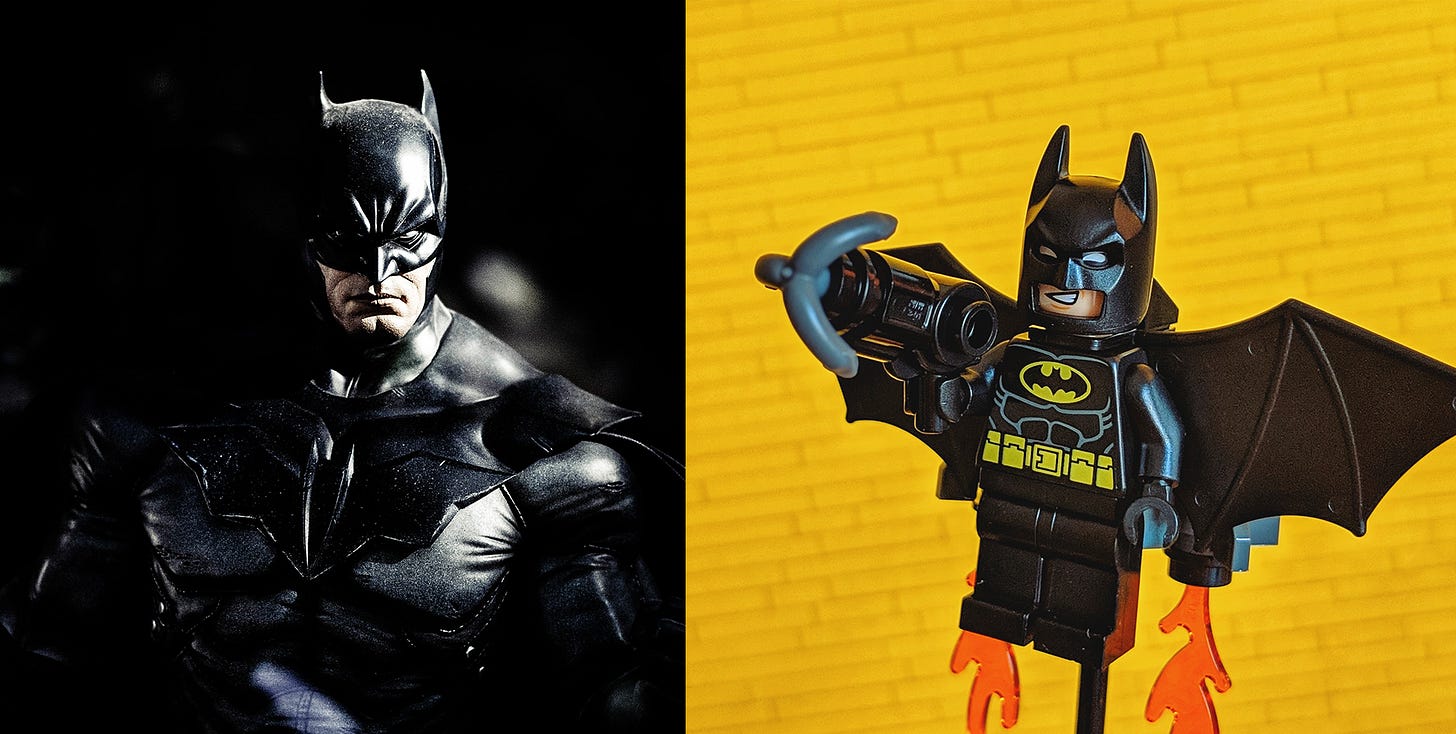Introducing HeroDAO
The State of Our Heroes
In 1939, Batman made his debut in a magazine called Detective Comics. This past March, over 80 years later, a new Batman movie was released, starring an actor who’d never played Batman and helmed by a director who’d never directed a Batman movie. During the intervening years, Batman’s appeared innumerable times in a variety of media—if you restrict yourself to film, you count at least 17 appearances.
Looking over those movie titles, it’s hard not to be struck by how disparately the character’s been portrayed by the many writers, directors, and actors who’ve been involved with his story. Compare the Batman of The Dark Knight to the Batman of The Lego Batman Movie. It’s the same character; but it also isn’t. And movies are only a portion of Batman’s history. There are also the TV series, video games, merchandising, and, the origin of it all, the comic books that each have their own version of Batman and have added to the multiplicity of visions his legacy is built upon.
It's not only Batman, of course. Think of any superhero who’s had their own movie in recent years—just like Batman, they’ve had their own evolution that’s been carried along by a legion of contributors.
This multigenerational, collective approach to character creation has become an inherent part of the comic book, much more than in other creative fields. What would it mean, for example, to continue—not to be inspired by, but to continue—the work of The Beatles or Jackson Pollock in 2022? And what if someone today published what they claimed was a sequel to The Great Gatsby? It would be looked at with suspicion, seen as illegitimate in a way that a new Batman movie or comic typically isn’t.
To put all this succinctly: when it comes to artistic contribution, comics have a spirit of openness that’s absent in most other arts. But because most of the famous comic book characters today have owners, the open approach to new contributors embraced by the community of fans and creators is restricted, in the end, by a small group of people who might not really care about a given character beyond how much they can profit from it.
Currently, there’s virtually no way for a creative fan to contribute to their favorite superhero’s universe and have that contribution seen as “legitimate.” Fanfiction is one outlet for working within a comic universe, but it’s rarely—if ever—integrated into a character’s broader cultural legacy, and the ability to copyright it or profit from it is fraught with legal risks.
The structure of a DAO is perfectly suited for overturning this dynamic and giving full power to the community of fans and creators that are at the core of a character’s success and longevity, and that is our aspiration at HeroDAO. This isn’t only because a DAO allows a fan with enough interest in a character to have a say over its fate. It’s also because anyone with an interest in adding to the character’s artistic legacy is given a chance to do so, and to know that their work will be given fair consideration by the community of fans and other creators. It’s this full openness to contribution that makes a DAO uniquely suited to take the collaborative aspect that’s long been integral to comics to its logical endpoint.
This also allows a conviction held by many comic book fans to finally be tested: that the community of fans knows what’s better for a character than its corporate owners. As the characters and worlds of the HeroDAO universe continue to grow, we will test the skills and judgment of the community in a way that hasn’t been done before.
The HeroDAO Community
HeroDAO changes what we mean when we talk about a community of fans and creators. Through the DAO’s membership system, the community becomes defined in a way that a comic book-based community never has been. First, there’s membership in the DAO, pure and simple, which means that anyone who owns at least a single DAO share owns a piece of the HeroDAO universe, and second, there’s the size of an individual’s influence in the DAO, which is determined by how many DAO shares they own.
Because shares are given out based on contribution to the DAO, an influence within the organization can be earned with time and effort. The biggest stakeholders will become those with the most interest in the DAO, those who have made the biggest contribution. But as more DAO shares are distributed, those big stakeholders will need to go on contributing or they’ll find their influence diluted. It’s a kind of self-healing mechanism to maintain the DAO’s vitality and wash out its more passive members. For those who are through contributing, it may make more sense to cash out their membership and leave the control to those that are continuing to earn more shares.
And shares are not only rewarded for comic creators. Anything that pushes the interests of the DAO forward can be turned into a proposal for shares. Someone could get shares for maintaining the DAO’s website; for running a HeroDAO booth at a convention; for catering a HeroDAO-hosted event. Whoever loves the characters and stories can contribute based on their skills to expand the DAO’s infrastructure, reach, community, or vision. All kinds of different perspectives will be reflected in the HeroDAO community, not just those of artists. It will be a community of comic book lovers where the only barrier to entry is the willingness to make a meaningful contribution.
As HeroDAO’s characters and stories grow, the community will always decide what path to chart next. If that sounds interesting to you, then join in and help shape a comic book world worth building. Whatever your skills and interests, there’s a place for your contribution here.
(Contributing Author: Jesse Anderson, HeroDAO Editor: Chaskers, Photos courtesy of Marcin Lukasik and Cassidy James Blaede on Unsplash)



